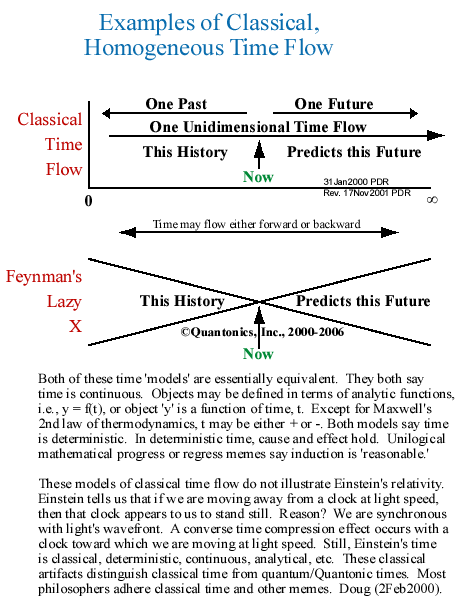We offer our contrived list of classical assumptions about
time:
- Time exists
- Time is a change meme for classical philosophy | science
- There is only one time; time is a homogeneous classical
concept
- It flows unidimensionally
- It is measurable but not definable
(Classicists presume their classical concept of space
is a proxy for time measurement; they measure time as
 space/space;
they offer n¤ coherent
definition of time in terms of itself or some other n¤nspatial
proxy. In our Quantonics view Millennium III quantum theory needs
a real, quantum
c¤herent, temporal exegetic for change other than
space. Bergson agrees — see his Time and Free Will
topics 16, 17,
18, 19.
Pirsig agrees. Stein
agrees. Added 22Jun2002 - Doug.)
space/space;
they offer n¤ coherent
definition of time in terms of itself or some other n¤nspatial
proxy. In our Quantonics view Millennium III quantum theory needs
a real, quantum
c¤herent, temporal exegetic for change other than
space. Bergson agrees — see his Time and Free Will
topics 16, 17,
18, 19.
Pirsig agrees. Stein
agrees. Added 22Jun2002 - Doug.)
- Time is continuous
- Time is infinitely divisible, thus differentiable and integrable,
thus stoppable and
restartable for any
analyst's convenience (See James
on Zeno's discrete motion paradox. See Bergson's Time
and Free Will Zeno comments in TaFW's topics 23,
15, 19,
22, and 34.
See our own memetics in Zeno's
Paradice.).
- Time is conveniently (conventionally) stoppable (See our
comments on quantum impossibility of classical analytic stoppability
in Bergson's Creative Evolution, Topic 40, page
310 comments. Large >300k page.)
- Time may be either negative
or positive
(except for Maxwell's 2nd law)*
- Time is relative
(since Einstein, ~1905; see Poincaré below)
- Time's relativity depends upon constant light velocity
- Time and space form a Minkowskian/Einsteinian
identity
*This is what we call classical time reversibility.
Note it is either/or. Quantum
reversibility distinguishes itself as both/and. Omnimensionally,
omniadically, we can say "all/and," for quantum
time's direction. (Our use of 'direction' here is
purely classical. We should QELRemediate
it using more quantum present participle plural, like this:
directionings. Classical inanimate singularity of di-rection
may be Victorian correct grammar, but it offers n¤ generally
valid exegetics n¤r exoterics of quantum
reality. Doug - 3Jul2002.) Maxwell's 2nd law assumes all
classical behavior involves thermalized energy transfer. Thermalized
energy transfers impose Maxwell's non-reversible classical arrow
of time. Maxwell did not know about quantum coherence (both
partial and non-partial) which permits non-thermalized,
lossless energy transfers. Quantum non-thermalized energy transfers
do not adhere Maxwell's 2nd law, and thus do not adhere its implied
classical arrow of time. See Mae-wan Ho's, the
Rainbow and the Worm.
On Classical Mechanics:
Henri Poincaré offers his anti-Platonic position on
classical time in his, Science and Hypothesis, Dover,
1952 reprint of 1905 translation, p. 90 of 244 total pages:
"1. There is no absolute space, and we only conceive
of relative motion; and yet in most cases mechanical facts are
enunciated as if there is an absolute space to which they can
be referred.
"2. There is no absolute time. When we say that
two periods are equal, the statement has no meaning, and can
only acquire a meaning by a convention.
"3. Not only have we no direct intuition of the equality
of two periods, but we have not even direct intuition of the
simultaneity of two events occurring in two different places.
I have explained this in an article entitled, Mesure du Temps,1
"4. Finally, is not our Euclidean geometry in itself
only a kind of convention of language? Mechanical facts might
be enunciated with reference to a non-Euclidean space which would
be less convenient but quite as legitimate as our ordinary space;
the enunciation would become more complicated, but it still would
be possible.
"Thus, absolute space, absolute time, and even geometry
are not conditions which are imposed on mechanics. All these
things no more existed before mechanics than the French language
can be logically said to have existed before the truths which
are expressed in French..."
1 Revue de Métaphysique et de Morale,
t. vi., pp. 1-13, January, 1898.

